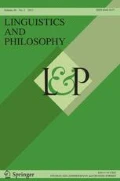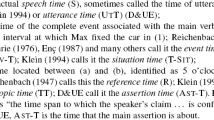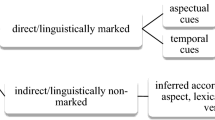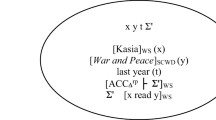Abstract
The only obligatory temporal expression in English is tense, yet Hans Reichenbach (1947) has argued convincingly that the simplest sentence is understood in terms of three temporal notions. Additional possibilities for a simple sentence are limited: English sentences have one time adverbial each. It is not immediately clear how to resolve these matters, that is, how (if at all) Reichenbach's account can be reconciled with the facts of English. This paper attempts to show that they can be reconciled, and presents an analysis of temporal specification that is based directly on Reichenbach's account.
Part I is devoted to a study of the way the three times—speech time, reference time, event time—are realized and interpreted. The relevant syntactic structures and their interaction and interpretation are examined in detail. Part II discusses how a grammar should deal with time specification, and proposes a set of interpretive rules. The study offers an analysis of simple sentences, sentences with complements, and habitual sentences. It is shown that tense and adverbials function differently, depending on the structure in which they appear. The temporal system is relational: the orientation and values of temporal expressions are not fixed, but their relational values are consistent. This consistency allows the statement of principles of interpretation.
An interesting result of the study is that the domain of temporal specification is shown to be larger than a sentence. Sentences that are independent syntactically may be dependent on other sentences for a complete temporal interpretation; complements may be dependent on sentences other than their matrix sentences. Time adverbials and tense may be shared, in the sense that a temporal expression in one sentence may contribute to the interpretation of another sentence. These facts have important consequences: only a grammar with surface structure interpretation rules can account for temporal specification in a unified manner, because more than one sentence may be involved. Context is thus shown to be crucial for the temporal interpretation of sentences.
Similar content being viewed by others
Bibliography
Banfield A.: 1973, ‘Narrative Style and the Grammar of Indirect Speech’, Foundations of Language 10, 1–39.
Benveniste E.: 1966, Problèmes de linguistique générale, Gallimand, Paris.
Boyd and Thorne: 1969, The deep grammar of modal verbs, Journal of Linguistics 5, 57–74.
Braroe, E.: 1974, The syntax and semantics of English tense markers. Monographs from the Institute of Linguistics, University of Stockholm. Monograph 1.
Costa, R.: 1972, ‘Sequence of tenses in that-clauses’, Papers from the 8th Regional Meeting, Chicago Linguistics Society, Chicago, Ill.
Crystal D.: 1966, ‘Specification and English tense’, Journal of Linguistics 2, 1–34.
Dowty, D.: 1972, Studies in the logic of verb aspect and time reference in English, Ph.D. dissertation, University of Texas, Austin, Texas.
Emonds, J.: 1974, ‘Parenthetical clauses. You take the high node and I'll take the low node’, Papers from the Comparative Syntax Festival, Chicago Linguistics Society, Chicago, Ill.
Fillmore, C.: 1975, Santa Cruz lectures of deixis’, Indiana University Linguistics Club.
Gallagher, M.: 1970, ‘Adverbs of time and tense’, Papers from the 6th Regional Meeting, Chicago Linguistics Society, Chicago, Ill.
Hamburger K.: 1968, Die logik der dichtung, E. Klett, Stuttgart.
Hofmann, T.: 1966, ‘Past tense replacement and the modal system’, Harvard Computation Laboratory, National Science Foundation Report No. 17, Cambridge, Mass.
Hornstein, N.: 1975, ‘As time goes by: a small step towards a theory of tense’, Montreal working papers in linguistics 5.
Jenkins, L.: 1972, Modality in English syntax, Ph.D dissertation, M.I.T. Cambridge, Mass.
Jespersen O.: 1931, Modern English grammar on historical principles, George Allen and Church, London.
Kiparsky P.: 1968, ‘Tense and mood in Indo-European syntax’, Foundation of Language 4, 30–57.
Kiparsky P., and Kiparsky C.: 1970, ‘Fact’ in Bierwisch and Heidolph, eds. Progress in Linguistics, Mouton, The Hague.
: 1969, ‘Presuppositions and relative grammaticality’, in W. Todd, ed., Studies in Philosophical Linguistics, Great Expectations Press, Cincinnatti, Ohio.
Leech G.: 1969, Toward a semantic description of English, Indiana Univ. Press, Bloomington.
Lawler, J.: 1972, ‘Generic to a fault’, Proceedings of the 8th Regional Meeting, Chicago Linguistics Society, Chicago, Ill.
McCawley J.: 1971, ‘Tense and time reference in English’, in Fillmore and Langendoen, eds., Studies in Linguistic semantics, Holt, Rinehart, Winston, New York.
Reichenbach H.: 1947, Elements of symbolic logic. University of California. Berkeley, Calif.
Riddle, E.: 1976, ‘A new look at sequence of tense’, unpublished paper.
Sadock J.: 1969, ‘Hypersentences’, Papers in Linguistics 1, 283–370.
Sadock J.: 1975, ‘Towards a linguistic theory of speech acts’, Academic Press, New York.
Smith C.: 1975a, ‘The analysis of tense in English’, Texas Linguistic Forum 1, 71–89.
Smith, C.: 1975b, ‘A new look at auxiliary have in English’, Proceedings of the Sixth Annual Meeting of the Northeastern Linguistic Society, McGill Univ., Montreal.
Smith, C.: 1976a, ‘Present curiosities’, Proceedings of the 12th Regional Meeting, Chicago Linguistics Society, Chicago, Ill.
Smith, C.: 1976b, ‘A theory of auxiliary have in English’, Indiana University Linguistics Club.
Verkuyl, H.: 1971, On the compositional nature of the aspects. Foundations of language supplementary series 15.
Author information
Authors and Affiliations
Rights and permissions
About this article
Cite this article
Smith, C.S. The syntax and interpretation of temporal expressions in English. Linguistics and Philosophy 2, 43–99 (1978). https://doi.org/10.1007/BF00365130
Issue Date:
DOI: https://doi.org/10.1007/BF00365130




